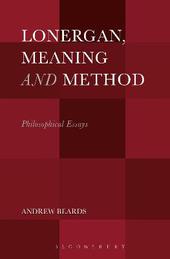
|
Lonergan, Meaning and Method: Philosophical Essays
Hardback
Main Details
Description
Bernard Lonergan (1904-84) is acknowledged as one of the most significant philosopher-theologians of the 20th century. Lonergan, Meaning and Method in many ways complements Andrew Beards' previous book on Lonergan, Insight and Analysis (Bloomsbury, 2010). Andrew Beards applies Lonergan's thought and brings it into critical dialogue and discussion with other contemporary philosophical interlocutors, principally from the analytical tradition. He also introduces themes and arguments from the continental tradition, as well as offering interpretative analysis of some central notions in Lonergan's thought that are of interest to all who wish to understand the importance of Lonergan's work for philosophy and Christian theology. Three of the chapters focus upon areas of fruitful exchange and debate between Lonergan's thought and the work of three major figures in current analytical philosophy: Nancy Cartwright, Timothy Williamson and Scott Soames. The discussion also ranges across such topics as meaning theory, metaphilosophy, epistemology, philosophy of science and aesthetics.
Author Biography
Andrew Beards is Academic Director at the School of the Annunciation, a Catholic Institute of higher education at Buckfast Abbey, UK. He is the author of Objectivity and Historical Understanding (1997), Method in Metaphysics: Lonergan and the Future of Analytical Philosophy (2008), Insight and Analysis (2010), and Philosophy the Quest for Truth and Meaning (2010).
ReviewsThis volume comprises six essays relevant to current academic philosophy ... In all six of these essays Beards is doing philosophy, paying careful attention to and engaging with work he values. The first essay also serves as an excellent introduction to Lonergan's philosophy. * CHOICE * Andrew Beards is one of the most insightful and lucid students of Lonergan alive today. His work is primarily philosophical but keeps an eye on theology and is provocative in both fields. He makes a significant contribution to Lonergan studies in his account of notions such as 'generalized empirical method.' However, his major achievement lies in his dialectical engagement with other authors, and here he is both respectful and penetrating. This book builds on previous exercises in proposing a critical realist 'third way' that can breach the 'Berlin wall' between continental philosophy and analytic philosophy. It deserves to be widely read and deeply considered. * Rev. Gerard Whelan SJ, Professor of Fundamental Theology at the Pontifical Gregorian University, Rome, Italy * In the finest authentic empowerment of Lonergans critical realist analysis on meaning and generalized empirical method, Beards explains how self and communal appropriation of his 'deep grammar' is the right path to redeem analytical philosophy from its dark metalogical foundations, discovering in it 'an extraordinarily powerful form of linguistic analysis.' Beards also sheds new lights on the aesthetic experience and concrete reality of human arts as transcendent, rightly details cognitional and epistemological implications of scientific theories as non-representational, and points to how Lonergans notion of control of meaning is implicit in the structuralism and deconstruction debate. Beards offers us, once more, a true and effective dialogue not only between seemingly opposing or unknown philosophical traditions but also, at his best, between incarnate human beings. * Francisco Sierra Gutierrez, Professor of Philosophy, Pontifical Xavierian University, Bogota, Colombia * For those seeking to find their way in a world of many philosophies I could not recommend Andrew Beards's Lonergan, Meaning and Method more highly. Intimately familiar with the analytic tradition, Beards unearths the deep structures that link us to one another and to the beyond. For those with or without a religious background Beards shows that uncovering the streams of meaning beneath our common sense, theoretical and even artistic activity opens us up to the world of history and to the beyond. This book should be on every serious student's shelf. * Richard M. Liddy, University Professor of Catholic Thought, Seton Hall University, USA * Throughout this work [Beards] demonstrates his mastery of both analytic philosophy and Lonergan's philosophical writings ... The author is to be congratulated in his efforts to engage in this dialogue which one can only hope finds a receptive audience among analytic philosophers. * Theological Studies *
|